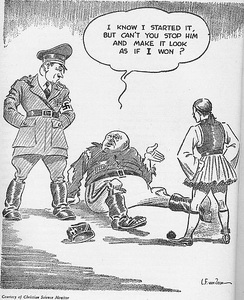I had always the stance in regards to the newer historical era of Greece that it would be too sad to read about it. Particularly after 1920. Metaxas was the PM since 1936, although later on he was vital in suspending parts of the Greek constitution due to a "state of emergency" declared.
Before being PM he had a military history and studies in Germany. He was important in the two Balkan wars, which were largely victorious for Greece (the ending of the second Balkan war was bordering on disaster though, and the gains of Greece in 1913- Treaty of Bucharest- were not as great as they originally were meant to be).
Metaxas famously opposed Eleutherios Venizelos (PM of Greece most importantly during the Balkan wars, late WW1, and the first phase of the Greek-Turkish war) when Venizelos asked in Parliament that Greece should join the Allies in WW1 so as to help them with their Dardanelles campaign. Metaxas argued that it would be a very bad move, given that the allies had already sent some of their best battleships to the straits, and Greece could not afford to lose its own ships and be effectively open to counter-attack.
When Venizelos lost the election during the Greek-Turkish war (a war which Metaxas had expressed arguments against, due to logistics) the military and ethnic disaster was near for Greece, and in 1922 the treaty of Sevres was cancelled. Greece lost all Eastern Thrace and the parts of Asia Minor it was awarded in 1920.
In 28 of October 1940 Italy's embassador to Greece, Emanuelle Grazzi, arrived to ask that Greece will grant the right to pass into its territory to Italian troops. Metaxas denied this. It was dawn, and the next day people woke up to the radio announcing the state of war between Greece and Italy.
Metaxas had built a series of forts in the Greek and Bulgarian border, which effectively protected Greece from Bulgaria, and later on caused heavy cassualties to German troops which tried to enter Macedonia through Bulgaria. While mostly remembered for his victory over the Italian invasion, and the consequent march of the Greek Army deep into Albania, then an Italian puppet-state, he is also heavily linked to European fascist movements, like in Germany, Spain and Italy.
His notoriety is largely a reflection of the old Schism in Greek politics, which was mostly the effect of the struggle between Venizelos and King Constantine, in 1914, which led first to Venizelos resigning as a PM, and later on forming a new government in Macedonia, centered in Thessalonike, so as to invite the Allies to land there.
Ioannes Metaxas:

King Constantine I and Venizelos:


Before being PM he had a military history and studies in Germany. He was important in the two Balkan wars, which were largely victorious for Greece (the ending of the second Balkan war was bordering on disaster though, and the gains of Greece in 1913- Treaty of Bucharest- were not as great as they originally were meant to be).
Metaxas famously opposed Eleutherios Venizelos (PM of Greece most importantly during the Balkan wars, late WW1, and the first phase of the Greek-Turkish war) when Venizelos asked in Parliament that Greece should join the Allies in WW1 so as to help them with their Dardanelles campaign. Metaxas argued that it would be a very bad move, given that the allies had already sent some of their best battleships to the straits, and Greece could not afford to lose its own ships and be effectively open to counter-attack.
When Venizelos lost the election during the Greek-Turkish war (a war which Metaxas had expressed arguments against, due to logistics) the military and ethnic disaster was near for Greece, and in 1922 the treaty of Sevres was cancelled. Greece lost all Eastern Thrace and the parts of Asia Minor it was awarded in 1920.
In 28 of October 1940 Italy's embassador to Greece, Emanuelle Grazzi, arrived to ask that Greece will grant the right to pass into its territory to Italian troops. Metaxas denied this. It was dawn, and the next day people woke up to the radio announcing the state of war between Greece and Italy.
Metaxas had built a series of forts in the Greek and Bulgarian border, which effectively protected Greece from Bulgaria, and later on caused heavy cassualties to German troops which tried to enter Macedonia through Bulgaria. While mostly remembered for his victory over the Italian invasion, and the consequent march of the Greek Army deep into Albania, then an Italian puppet-state, he is also heavily linked to European fascist movements, like in Germany, Spain and Italy.
His notoriety is largely a reflection of the old Schism in Greek politics, which was mostly the effect of the struggle between Venizelos and King Constantine, in 1914, which led first to Venizelos resigning as a PM, and later on forming a new government in Macedonia, centered in Thessalonike, so as to invite the Allies to land there.
Ioannes Metaxas:

King Constantine I and Venizelos:



